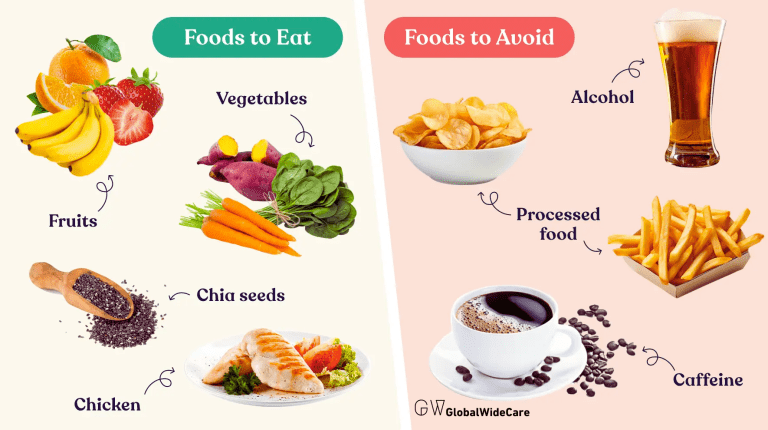
Section Overview
Polycystic Ovary Syndrome (PCOS) affects millions of women worldwide, disrupting their hormonal balance and leading to various health challenges. Diet plays a crucial role in managing Polycystic Ovary Disorder symptoms, and understanding which foods to eat and which to avoid can significantly improve your health. This guide provides a detailed Polycystic Ovary Disorder diet plan to help you on your journey to better health.
What is PCOS?
Polycystic Ovary Syndrome (PCOS) is a common hormonal disorder that affects women of reproductive age. It is characterized by the presence of multiple cysts on the ovaries, irregular menstrual cycles, and elevated levels of male hormones (androgens). Women with Polycystic Ovary Disorder often experience symptoms such as:
- Irregular periods or no periods at all
- Excessive hair growth on the face and body (hirsutism)
- Acne and oily skin
- Weight gain or difficulty losing weight
- Thinning hair or hair loss on the scalp
PCOS can also lead to long-term health problems, including type 2 diabetes, heart disease, and infertility. While the exact cause of PCOS is unknown, it is believed to be related to insulin resistance, inflammation, and genetic factors.


Why Diet Matters in PCOS?
When managing PCOS, the right diet can help regulate insulin levels, balance hormones, and reduce symptoms. Many women find that dietary changes are one of the most effective ways to manage their condition. Consistently choosing nutrient-dense foods can lead to sustainable weight management and improved overall well-being. Additionally, a tailored diet can support better energy levels and enhance fertility.
Foods to Eat for PCOS
Incorporating the following foods into your diet can help manage Polycystic Ovary Disorder symptoms and improve overall health:
1. High-Fiber Vegetables
- Broccoli
- Cauliflower
- Brussels sprouts
- Kale
High-fiber vegetables help combat insulin resistance by slowing down digestion and reducing the impact of sugar on the blood. They also promote a healthy digestive system and help maintain a feeling of fullness.


2. Lean Protein
- Chicken
- Turkey
- Tofu
- Fish
Lean proteins provide essential nutrients without the extra calories and unhealthy fats found in red meats. They help stabilize blood sugar levels and keep you feeling full longer. Additionally, proteins are crucial for muscle repair and overall body maintenance.


3. Healthy Fats
- Avocado
- Olive oil
- Nuts
- Seeds
Healthy fats are crucial for hormone production and overall health. They also help you feel satiated and reduce cravings for unhealthy snacks. Omega-3 fatty acids found in certain nuts and seeds are particularly beneficial for reducing inflammation.
4. Low-Glycemic Index Foods
- Berries
- Cherries
- Plums
- Peaches
Low-GI foods prevent blood sugar spikes, helping to manage insulin levels more effectively. These fruits provide essential vitamins and antioxidants without causing a rapid increase in blood sugar.
5. Anti-Inflammatory Foods
- Tomatoes
- Spinach
- Almonds
- Turmeric
Anti-inflammatory foods can help reduce Polycystic Ovary Disorder symptoms and improve overall health by decreasing inflammation in the body. Inflammation is a key factor in Polycystic Ovary Disorder and managing it can alleviate many symptoms.
Foods to Avoid for PCOS


Certain foods can exacerbate PCOS symptoms and should be limited or avoided altogether:
1. Refined Carbohydrates
- White bread
- Pastries
- Sugary cereals
- Pasta
Refined carbohydrates can cause significant spikes in blood sugar levels, leading to increased insulin production and exacerbating Polycystic Ovary Disorder symptoms. They are often low in fiber and nutrients, making them less beneficial for overall health.
2. Sugary Foods and Beverages
- Sodas
- Candies
- Baked goods
- Fruit juices
Sugary foods and drinks can lead to weight gain and insulin resistance, making Polycystic Ovary Disorder symptoms worse. They provide empty calories and can contribute to cravings and overeating.
3. Processed Foods
- Fast food
- Chips
- Packaged snacks
- Frozen meals
Processed foods often contain unhealthy fats, sugars, and additives that can negatively impact your health and exacerbate Polycystic Ovary Disorder symptoms. They are typically high in calories and low in essential nutrients.
4. Dairy Products
- Milk
- Cheese
- Yogurt
- Ice cream
Dairy products can increase insulin levels and are sometimes linked to higher levels of androgens, which can worsen PCOS symptoms. Opting for plant-based alternatives can be beneficial.
5. Red and Processed Meats
- Bacon
- Sausage
- Deli meats
- Steak
These meats can be high in unhealthy fats and additives, contributing to inflammation and worsening Polycystic Ovary Disorder symptoms. Choosing leaner protein sources can help manage symptoms more effectively.
Comparison of Foods to Eat and Avoid for PCOS
Here’s a comparison table to highlight the key differences between foods to eat and avoid for managing Polycystic Ovary Disorder:


Category | Foods to Eat | Foods to Avoid |
Carbohydrates | Whole grains, quinoa, oats | White bread, pastries, sugary cereals |
Protein | Chicken, turkey, tofu, fish | Bacon, sausage, deli meats, steak |
Fats | Avocado, olive oil, nuts, seeds | Trans fats, fried foods, processed snacks |
Dairy | Plant-based alternatives (almond milk) | Milk, cheese, yogurt, ice cream |
Fruits and Vegetables | Berries, cherries, plums, peaches | High-sugar fruits (bananas, grapes) |
Anti-Inflammatory Foods | Tomatoes, spinach, almonds, turmeric | Processed foods, fast food |
Sugary Foods and Drinks | Minimal (dark chocolate) | Sodas, candies, baked goods, fruit juices |
Tips for a PCOS-Friendly Diet
Transitioning to a Polycystic Ovary Disorder-friendly diet can be challenging, but these tips can help make the process easier:
Meal Planning and Preparation
Planning your meals in advance can help ensure you have healthy, Polycystic Ovary Disorder-friendly foods available. Try batch cooking on weekends and storing meals in portioned containers for the week. This not only saves time but also reduces the temptation to reach for unhealthy options.
Reading Food Labels
Be vigilant about reading food labels to avoid hidden sugars and unhealthy fats. Look for whole foods with minimal ingredients. Understanding labels can help you make more informed choices and avoid foods that may trigger PCOS symptoms.
Staying Hydrated
Drinking plenty of water is essential for overall health and can help manage PCOS symptoms. Aim for at least 8 glasses of water a day. Proper hydration supports metabolic processes and can help control hunger and cravings.
Mindful Eating
Practicing mindful eating can help you better enjoy your meals and recognize when you’re full, reducing the likelihood of overeating. Focus on the experience of eating and savor each bite, which can improve digestion and satisfaction.
Sample Meal Plan for PCOS
Here is a simple meal plan to give you an idea of how to structure your diet:
Breakfast
- Smoothie with spinach, avocado, berries, and almond milk
- Whole grain toast with avocado and a poached egg
Lunch
- Grilled chicken salad with mixed greens, tomatoes, cucumbers, and olive oil dressing
- Quinoa and vegetable stir-fry
Snack
- Handful of almonds and a piece of fruit
- Greek yogurt with flaxseeds
Dinner
- Baked salmon with steamed broccoli and brown rice
- Vegetable curry with lentils and whole grain naan
Dessert (optional)
- Dark chocolate square and herbal tea
Conclusion
Managing PCOS through diet involves making informed choices about what to eat and what to avoid. By incorporating high-fiber vegetables, lean proteins, healthy fats, low-GI foods, and anti-inflammatory foods into your diet, you can significantly improve your health. Conversely, avoiding refined carbohydrates, sugary foods and beverages, processed foods, dairy products, and red and processed meats can help reduce Polycystic Ovary Disorder symptoms.
For more information on managing Polycystic Ovary Disorder through diet, check out these external resources:
By following these dietary guidelines and making healthy lifestyle changes, you can take control of your PCOS symptoms and improve your overall well-being.